Diplomatic Bluebook 2018
Chapter 4
Japan's Diplomacy Open to the Public
1 Overseas Risks and Safety of Japanese Nationals
(1) Incidents and Accidents in 2017 and Countermeasures
There were no Japanese victims in terrorist attacks in 2017, despite the world seeing a large number of terrorist attacks. The recent tendency of terrorist attacks includes terrorism happening not only in the Middle East and Africa but also in Europe, the U.S. and Asia where many Japanese travel and reside. Both homegrown terrorism perpetrated by people born in Western countries and indoctrinated through websites or other means by foreign Islamic extremists and lone-wolf terrorism perpetrated by people acting solely with little organizational background are found in tremendous numbers. Additionally, terrorist attacks aimed at “soft targets” where large numbers of the general public gather everyday are on the rise. This tendency has not changed despite the fact that ISIL is losing its territory in Syria and Iraq. Also, foreign fighters of ISIL now are returning to their home countries or moving to third countries. These factors make it more difficult to prevent terror attacks.
The following incidents in 2017 demonstrate this tendency: the bombing at a subway in St. Petersburg, Russia, in May; the suicide bombing at a concert hall in Manchester, UK, in May; the suicide bombing at a bus terminal in Jakarta, Indonesia, in May; the vehicle and knife attack around the London Bridge, UK, in June; the vehicle attacks in Barcelona and Cambrils, Spain, in August; and the vehicle attack at Manhattan in New York, U.S., in October, etc.
As for crimes overseas, murder incidents involving Japanese nationals occurred in several countries such as the Philippines, Indonesia, the U.S. and Brazil. One such example victimizing Japanese students overseas is the murder of a male Japanese student by a rampaging driver in Australia in January.
Incidents involving Japanese nationals include: a drowning in a waterfall at a famous tourist spot in Punta Arenas, Costa Rica, in February; a drowning while surfing off the coast of Bali, Indonesia, in June; a fall accident while hiking in Sequoia National Park in California, U.S., in July; falling accidents on Mt. Monch and Mt. Zermatt, Switzerland, in July and August; a death by a hotel fire in Yangon, Myanmar, in October; and a traffic accident in Ayutthaya, Thailand, in November.
Japanese nationals were also affected by various major natural disasters, including the earthquake in southern Mexico in September, the large hurricane that struck the southern U.S. and countries in Latin America and the Caribbean and the volcanic activities of Mt. Agung on Bali, Indonesia. There were a number of incidents of political instability that could have affected Japanese nationals, such as the general and presidential elections in Kenya, the separatist movements triggered by the referendum in the Catalonia Region of Spain and the missile attacks by anti-government forces in Yemen targeting Saudi Arabia.
As was the case previous year, there were continued reports of people dying from sudden illnesses during their trip.
In some of such cases, family members of the victims faced difficulties dealing with higher medical and transportation costs and insufficient medical services compared to those in Japan.
As for infectious diseases, cases of Ebola were reported in the Democratic Republic of the Congo, and there continue to be reports of cases of the Middle East Respiratory Syndrome (MERS) in the Middle East and human infection with avian influenza A (H7N9) virus in China. Mosquito-borne diseases, such as Zika virus, Dengue fever and malaria, also continued to spread throughout the world.
MOFA issues “Overseas Travel Safety Information” on infectious disease and air pollution in countries and regions where health and medical caution is required, to provide Japanese nationals staying abroad with information on the current outbreak situation and prevention measures as well as with relevant warnings.
(Tips for Traveling and Living Abroad)
As described in the above incidents, threatening of the safety of Japanese nationals constantly occurred all around the world. In addition to registration to “Overseas Travel Registration (“Tabi-Regi”)” or submission of Overseas Residential Registration, it is important to take the following actions when traveling and living abroad: (1) checking security and other information through the Overseas Safety Website, media and other sources, (2) taking adequate safety measures to avoid risks, and (3) contacting the nearest Japanese diplomatic missions overseas and family in Japan in case of emergency. It is very important for each individual to take out travel insurance with a sufficient coverage since the lack of travel insurance may make it difficult to pay the medical expenses or to receive proper medical care in case of diseases and accident injuries due to expensive medical fees abroad.
(2) Safety Measures for Japanese Nationals Overseas
While Japanese nationals play an active part in the international community, there are many cases of Japanese nationals suffering dameges overseas. The number of cases where Japanese nationals received support or protection from the diplomatic missions overseas and the Japan-Taiwan Exchange Association has stayed on a high level. There were 20,437 by person and 18,566 by case in 20162.
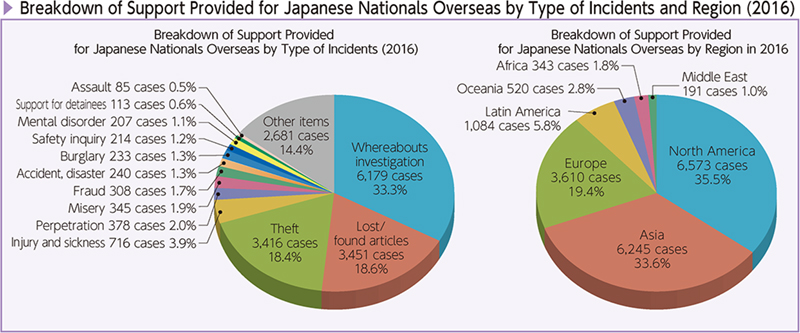
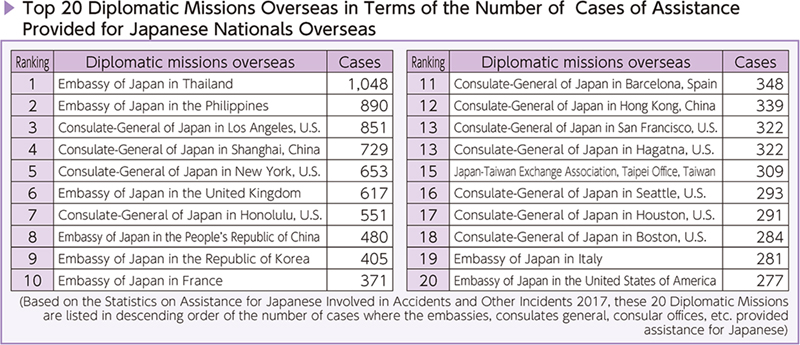
In order to avoid accidents and troubles overseas, it is important to collect information before traveling abroad. MOFA works to enhance the safety awareness of Japanese nationals and promote its measures by disseminating and sharing information on safety measures.
MOFA issues the latest safety information worldwide on the Overseas Safety Website and emails newly uploaded local information to Japanese nationals staying overseas with Overseas Residential Registrations and short-term travelers with registration in the Overseas Travel Registration (“Tabi-Regi”) Diplomatic mission overseas release safety information as well. “Tabi-Regi” is also available to those without travel plans through simple registration. The distributed safety information is widely utilized by Japanese business persons in charge of foreign operations in such a way as to plan safety measures. Since “Tabi-Regi” was launched in July 2014, MOFA has improved its user-friendliness and sponsored many activities to increase registrants. Currently, a cumulative total registration is more than 3 million and the number of registrants per year is close to reach 2 million people.
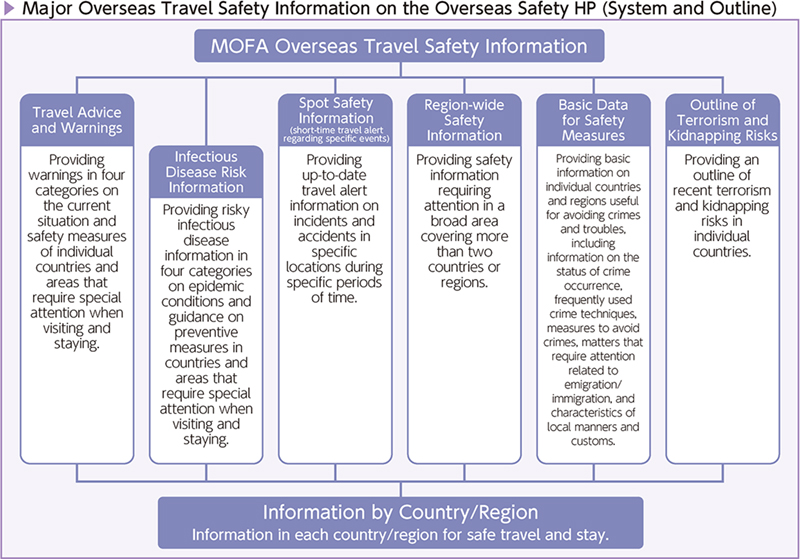
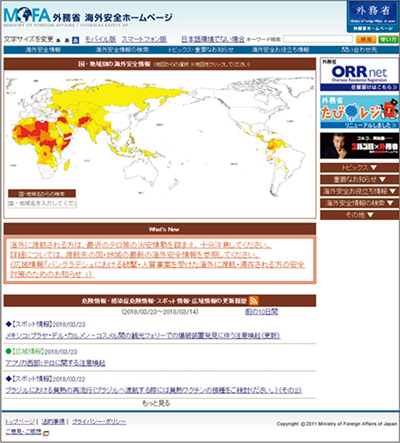 MOFA Overseas Safety Website (https://www.anzen.mofa.go.jp/)
MOFA Overseas Safety Website (https://www.anzen.mofa.go.jp/)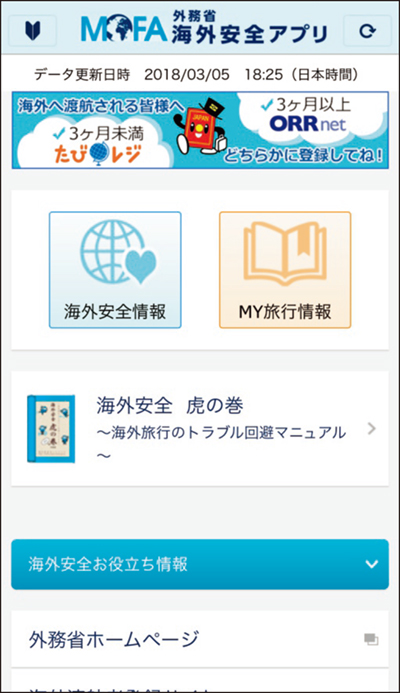 MOFA Overseas Safety App
MOFA Overseas Safety AppOverseas safety website “About the Overseas Safety App Services”
Can be downloaded from (http://www.anzen.mofa.go.jp/c_info/oshirase_kaian_app.html)
 MOFA “Overseas Travel Registration (“Tabi-Regi”)”
MOFA “Overseas Travel Registration (“Tabi-Regi”)”https://www.ezairyu.mofa.go.jp/tabireg/index.html
MOFA strives to enhance the knowledge and capability of the Japanese people concerning safety measures and crisis management through seminars and trainings. MOFA has hosted safety measure seminars in and out of Japan and sent lecturers from the Consular Affairs Bureau to seminars nationwide organized by other organizations and associations (over 100 times in FY 2017). MOFA also hosted “Public-Private Joint Practical Training for Counter-Terrorism and Anti-Kidnapping Measures” with the participation from private companies. These efforts are beneficial not only for taking preventive measures against dangers like terrorism, but also for enhancing response capabilities in case of emergency.
The public and private cooperation in overseas safety measure is proceeding. The diplomatic missions overseas host regular meetings of “Security Consultation and Liaison Committees” with local Japanese nationals to share information, exchange opinions and bolster collaboration in preparation for emergencies.
After the terrorist attack in Dhaka in July 2016, MOFA has worked to enhance the awareness of safety measures and the response capabilities of people, particularly the international cooperation personnel, small and medium enterprises, students studying abroad, short-term travelers and others who have limited access to information on safety.
MOFA launched the “Small and Medium Enterprise Overseas Safety Measures Network,” with the participation of 29 organizations and agencies related to overseas expansion of Japanese businesses in September 2016, in order to support SMEs, which account for the vast majority of Japanese companies. The collaboration among members in this network has strengthened safety measures of those companies, such as raising safety awareness through seminars and newsletters, establishing horizontal relationships among participating companies and seeking to provide better support services for business, etc. Furthermore, in March 2017, MOFA released “Golgo 13's Security Guidelines for Japanese SMEs abroad,” which explains the basic safety measures for the companies in an easy-to-understand manner using famous manga (cartoons). After its release, about 90,000 copies of the fine printed version have been distributed and the special webpage has gotten about 1.7 million views, which shows that the guidelines have been used by Japanese businesses widely and contributed to raising awareness on overseas safety measures.
 ©Takao Saito
©Takao SaitoGolgo 13's Security Guidelines for Japanese SMEs Abroad
http://www.anzen.mofa.go.jp/anzen_info/golgo13xgaimusho.html
MOFA is working to enhance the awareness of safety measures for Japanese students studying overseas and aid in the establishment of crisis management systems at schools. MOFA sends lecturers to universities and other educational institutions, many of which have insufficient knowhow or experience on safety measures and emergency responses. MOFA is going forward with efforts to connect government agencies with educational institutions, overseas study agencies and students by such means as beginning automatic registration to “Overseas Travel Registration (“Tabi-Regi”)” with some overseas study institutions.
As for safety measures for short-term travelers, MOFA is engaged in PR activities to encourage them to register in “Overseas Travel Registration (“Tabi-Regi”).” MOFA aims to reach 2.4 million as the number of cumulative registrants by the summer of 2018. The number of registrants increased from about 610,000 to about 1.49 million through January to December in 2016.
In addition, MOFA hosted an overseas safety measure seminar for tour guides in June and crisis managers of travel companies in July in an effort to convey the importance of travel companies and tour guides working on safety measures and to call for cooperation in developing safety measures for travelers.
- 2 The Statistics on Assistance for Japanese Involved in Accidents and Other Incidents, first published in 1986, is an annual report on the number of cases/people where the diplomatic missions overseas and the Japan-Taiwan Exchange Association provided assistance to Japanese nationals involved in any kind of troubles overseas, such as incidents/accidents, acts of committing crimes and falling victim to crime or disaster.
